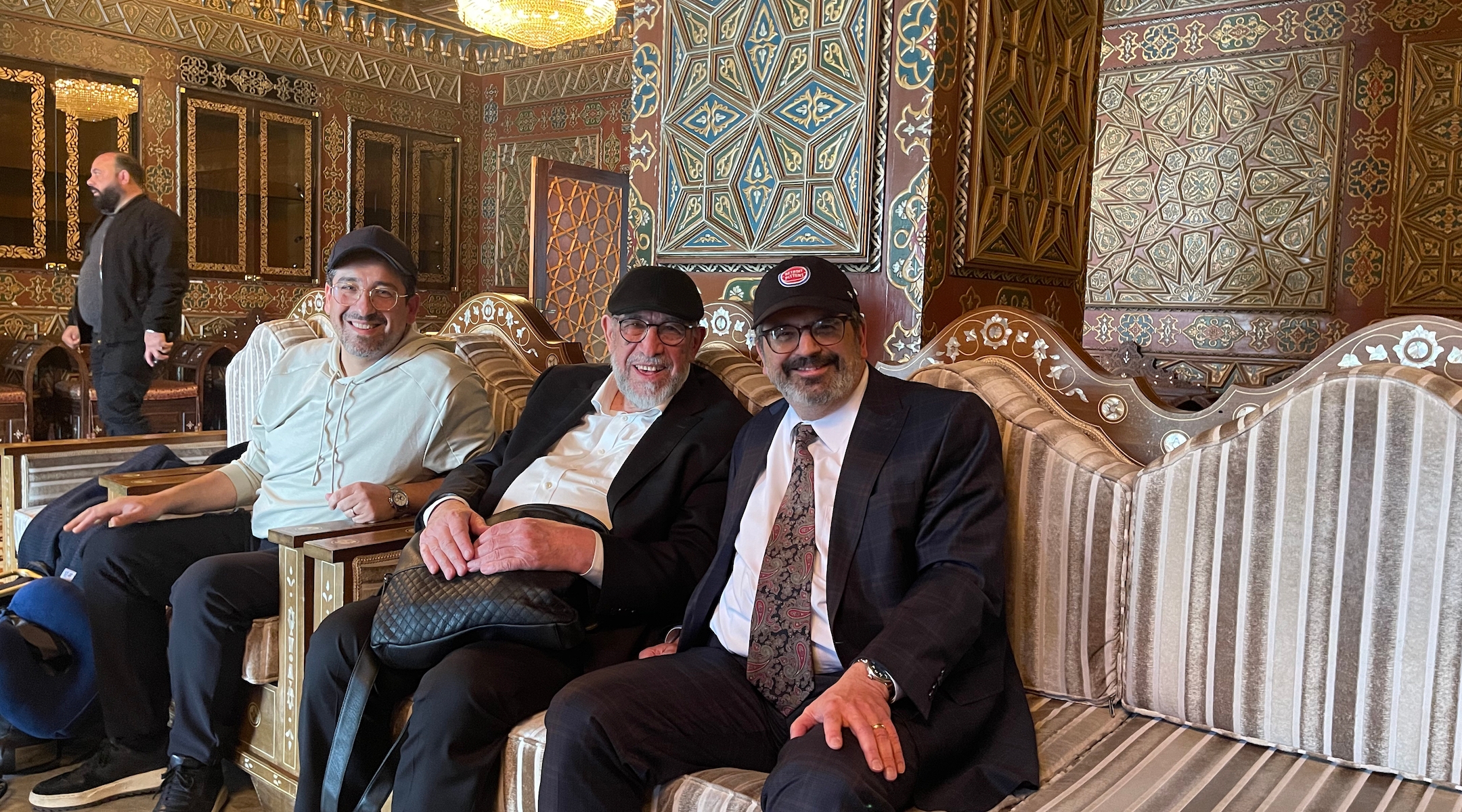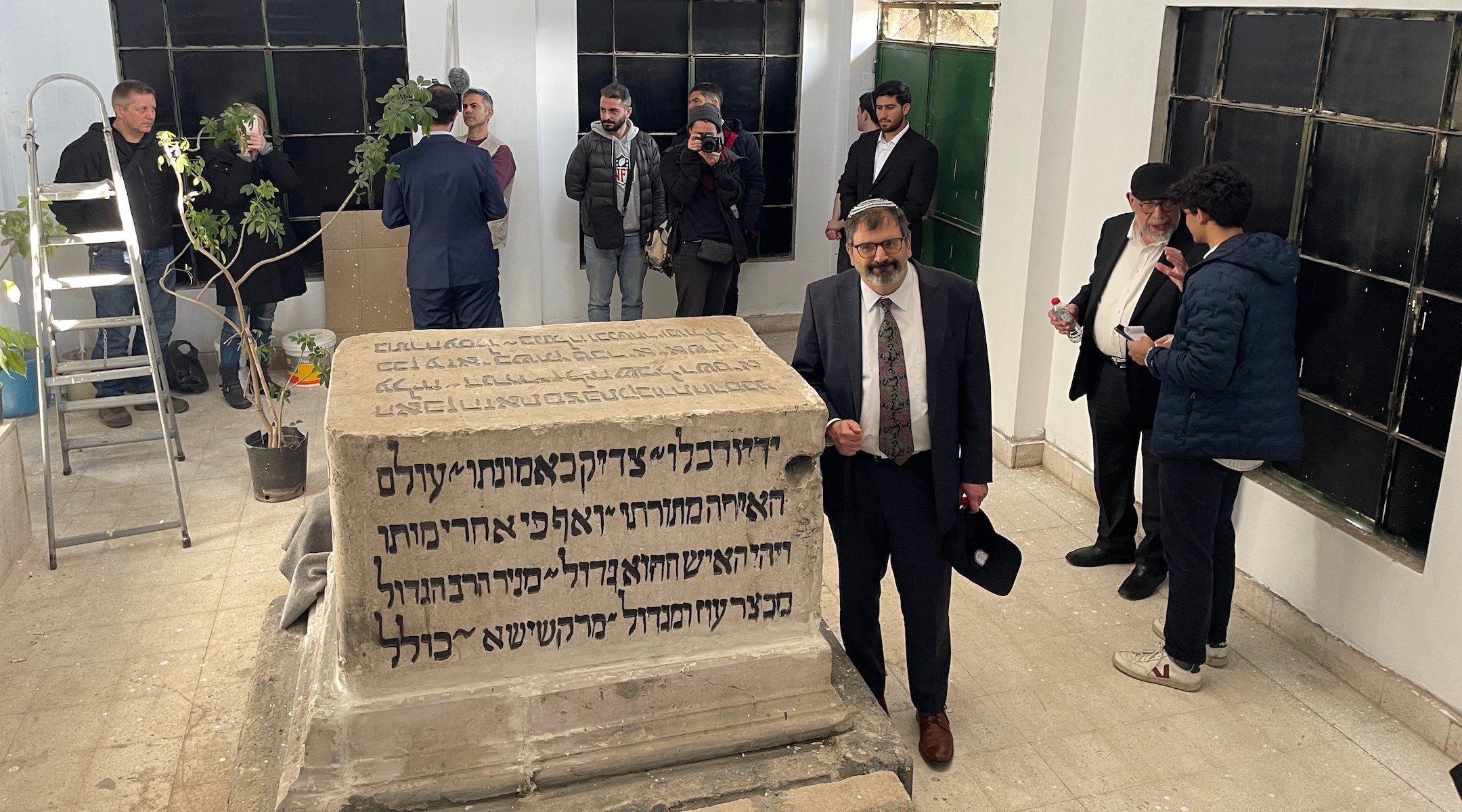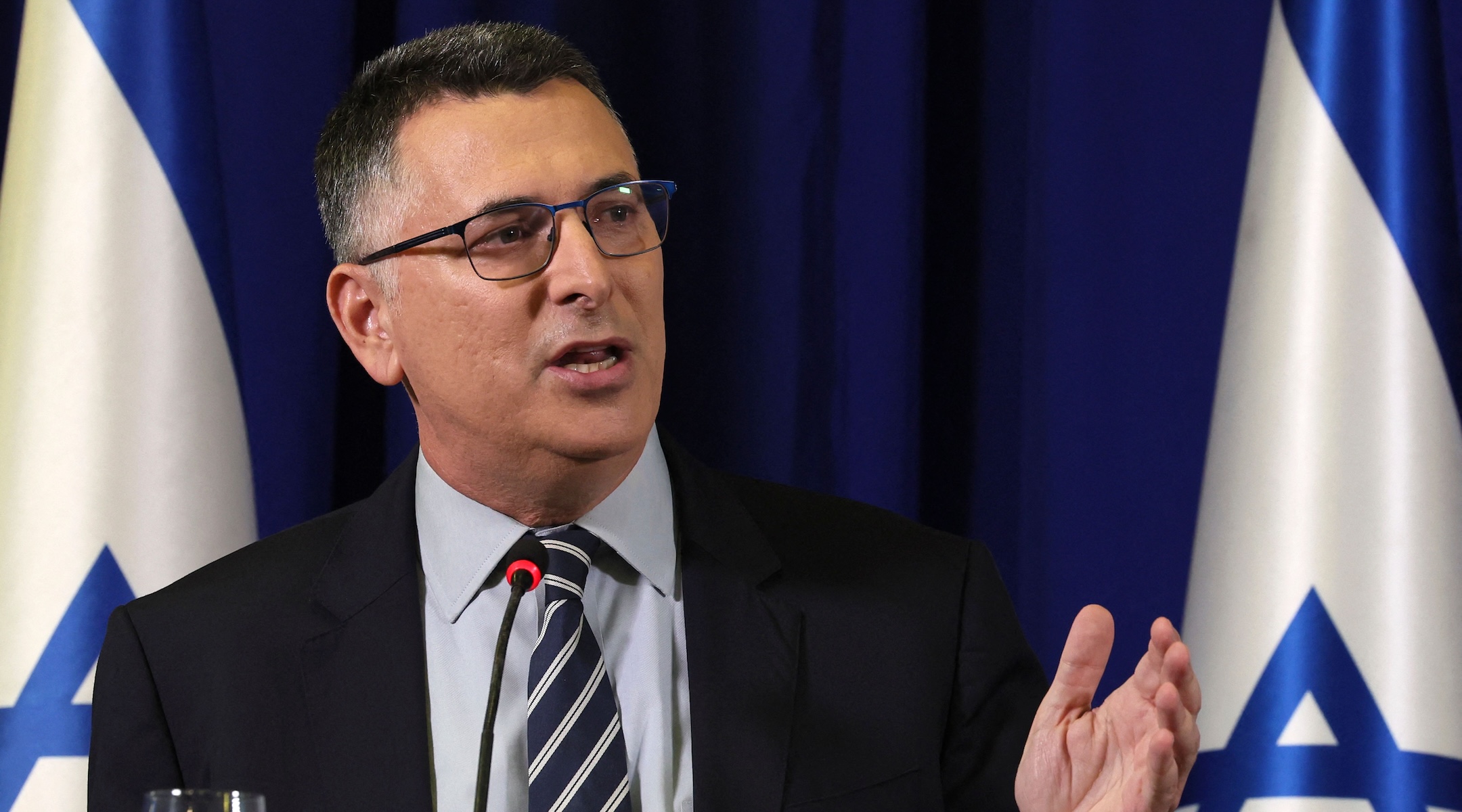Even as tensions between Israel and Syria ramped up in recent days, a small group of Syrian Jews recently celebrated a milestone that once seemed unthinkable: a return visit to their home country.
Under the auspices of the new Syrian government, a small delegation toured Jewish heritage sites in and around Damascus last week, just two months after the fall of the dictatorial Bashar al-Assad regime. The group said it was the first official Jewish delegation to visit Syria, a country that once was home to as many as 100,000 Jews, in over three decades.
Visiting historic synagogues and praying with Torah scrolls that had remained intact through the country’s brutal, 14-year civil war, these Jews were celebrating a homecoming. The visit could allow them and their descendants to imagine a potentially bright future in a place long thought lost to the many Jews who’d once called it home.
Days after the trip, Israel launched military strikes on Syria as the country’s new leader and large numbers of protesters demanded Israeli troops withdraw from the country’s southwestern region. Israel says it is occupying the area, the Syrian side of the Golan plateau, as a security measure amid instability in Syria.
Despite the overarching uncertainty — or perhaps because of it — members of the Jewish trip said anything felt possible.
“Everyone was so excited,” Rabbi Asher Lopatin, one of the Jewish delegates, told JTA about the heritage tour. “The people are so kind and really, very, very nice.”
Spearheading the trip was Rabbi Yusuf Hamra and his son Henry, Jews who left Syria during the final wave of mass Jewish emigration in the early 1990s. Henry was 15 at the time. The Hamra family resettled in New York, along with thousands of other Syrian Jews who maintain a vibrant and distinctive community, but retain dreams of returning to the Damascus of their past.
“The whole community was like one family,” Henry Hamra told the Times of Israel about his upbringing in Syria. “Then you’re changing a whole country. Especially when you go to America, you get lost in the big city.”

The Hamra family and Rabbi Asher Lopatin stay at a hotel in Damascus, Syria, as part of the first Jewish delegation to the country in 33 years, February 18, 2025. (Courtesy of Asher Lopatin)
For more than a century Syria became increasingly inhospitable to its once-thriving Jewish population. Blood libels and other incidents targeting the country’s Jewish minority persisted from the 1800s through the 20th century.
As in countries across the Arab world, antisemitic persecution, and Jewish emigration, spiked with Israel’s establishment in 1948, when Syria was one of a group of neighboring states to attack the nascent country.
It was the first of three wars Israel and Syria would fight over the next 25 years, including the 1967 Six Day War, when Israel captured the Golan Heights. The countries have not fought in half a century but still do not have relations, despite some attempts years ago at peace talks.
Over that time, Syria’s Jewish population has only dwindled further, to a current population estimated at fewer than a dozen who still call the country home. Graves at a historic Jewish cemetery were disinterred to build a highway decades ago. Some non-Jewish locals, by contrast, have guarded ancient Torah scrolls, preventing them from being damaged or lost.
And since the 2011 outbreak of the brutal Syrian civil war — in which Assad launched an assault on citizens and rebel factions trying to oust him from power — synagogues and other Jewish landmarks were destroyed or badly damaged as overall death tolls topped 600,000 and the Syrian refugee population skyrocketed into the millions.
After Assad fled and a new government headed by interim president Ahmad al-Sharaa — who used to belong to groups affiliated with al-Qaeda and ISIS — took control, the Hamras saw an opening to return for an official visit. (A relative of theirs had been making several unofficial trips to Syria in the intervening decades, including a Damascus “vacation” in 2021.) They contacted the Syria Emergency Task Force, a U.S.-based organization formed in 2011 to oppose the Assad regime.
“We welcome your visit and your generous initiative,” Moaz Mustafa, the group’s director, wrote to the Hamras in response to their request to tour Damascus, in a letter translated from the Arabic and viewed by JTA.

Rabbi Asher Lopatin poses at a Jewish historic site in Damascus, Syria, as part of the first Jewish delegation to the country in 33 years, February 18, 2025. (Courtesy of Asher Lopatin)
Mustafa also assured the group that the Syrian government would provide security detail for the Jewish delegation throughout the four-day trip. The task force, which aims to lift international sanctions on Syria now that Assad is out of power, would go on to trumpet the trip as “marking a historic step toward reestablishing Jewish life in Damascus.”
For now, though, there is only a tiny trickle of Jews returning to Damascus. The Hamras were able to round up nine participants for their delegation, not enough for a minyan required for some Jewish prayers. Travel into Syria was its own logistical challenge, with much of the group flying in from Qatar, while another small contingent drove in from Lebanon, where Israel has troops stationed in response to the war with Hezbollah that followed Oct. 7.
Lopatin, who works for the Jewish Federation of Ann Arbor, Michigan, has no Syrian heritage; he joined the group at the behest of a Syrian Muslim interfaith coalition partner. Still, he said, the trip was eye-opening.
“I kept on thinking about the Jews returning to Europe, to Poland, after World War II, All over Europe, they were suspicious,” he said. By contrast, “Here, everyone was so excited.”
Local Syrians, Lopatin said, were excited to greet the Jews, who he said were welcomed everywhere they went, even with him openly sporting a kippah. “For them, the Jews coming back represents a restoration of, I think, civility to Syria, the idea that we are all one,” he said. “That’s what the government is promoting.”
One subject that did not come up much during the Jewish delegation’s trip was Israel. In recent days prior to the Israeli strikes, Syrians had begun demonstrating at the border against Israel’s military presence as Israel has demanded a complete demilitarization of the country’s south.
At a constitutional dialogue in Syria on Tuesday attended by Sharaa, during which the country’s leaders outlined basic freedoms for their people they hope to one day enact, national rulers also took the opportunity to denounce Israel’s incursion.
Lopatin said the omission of any mention of Israel was an intentional move, and a “smart” one on behalf of the group’s Syrian handlers.
“There’ll be a time to negotiate with Israel and talk about that,” he said. “But for now it was, let’s try to bring Syrians together, let’s try to get rule of law in Syria.” In the future, he mused, “If this could be a breakthrough for Syria to recognize Israel, that would be something.”
Back in the United States, Lopatin said he wants to try to “advocate” for Syria any chance he gets. “It’s a charming city,” he said of Damascus. “It’s a little scruffy, but it’s a wonderful place and very charming and very nice.”
Keep Jewish Stories in Focus.
JTA has documented Jewish history in real-time for over a century. Keep our journalism strong by joining us in supporting independent, award-winning reporting.








 English (US) ·
English (US) ·